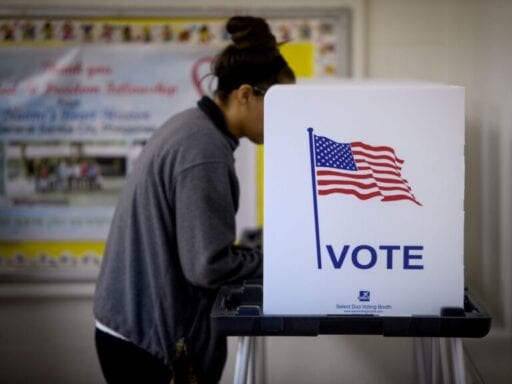The new proposed date is June 2.
Ohio Gov. Mike DeWine has officially recommended that the state delay its primary, originally scheduled for Tuesday, March 17, as part of its response to the coronavirus outbreak.
It’s set to be rescheduled for Tuesday, June 2, and voters will be able to submit absentee ballots until that date as well.
The state, as of Monday, had seen 50 positive tests for the coronavirus. It’s one of four major states that was scheduled to hold a primary on Tuesday. The other three, Florida, Illinois, and Arizona, were still expected to move forward with their elections as of Monday afternoon.
Ohio officials indicated that their decision to postpone the primary was in response to feedback they’d received from constituents and poll workers who were interested in participating but afraid to go to the polls on Tuesday. Additionally, they noted that the standard process would not adhere to guidelines from the Centers for Disease Control, which has urged people to avoid gatherings of 50 or more people (and to avoid gatherings of 10 or more among high-risk populations).
“We can’t tell people it’s in their best interest to stay home and at the same time tell people to go vote,” DeWine said in his remarks.
DeWine won’t be able to make this decision on his own, however. As noted in the press conference by Secretary of State Frank LaRose on Monday, the legislature and the courts are the ones with the ability to postpone the election. DeWine intends to file a lawsuit with voters who feel disenfranchised by the current primary timing and said he believes the courts will issue an order delaying it.
The logistics of this Tuesday’s primaries have been especially fraught, given recent CDC recommendations about social distancing and avoiding crowded places, a descriptor that can often refer to polling stations where voters end up queuing in long lines.
All four states had previously imposed precautions to help protect voters and polling workers: They’ve shifted hundreds of polling stations away from senior living facilities to other community locations like school and libraries, extended polling hours and committed to rigorously disinfecting machines.
As major cities close down in-person service at restaurants and bars, and discourage other widely attended events like sports games, however, the decision to hold primaries on Tuesday continues to raise questions about how to most effectively protect those participating in them.
Ohio joins Georgia and Louisiana, two states with later primaries, in making the major decision of cancelling its primary, for now.
Mail-in voting and absentee ballots could make a big difference
While the states holding primaries this week were faced with unique challenges given the timing of their elections, states that have races later in the calendar could continue to encourage voter participation amid the coronavirus outbreak via vote-by-mail and absentee options.
In Ohio, for example, absentee ballots can be submitted via mail. And in states like Washington, which has already voted, mail-in voting comprised the majority of the ballots that were cast.
Due to the coronavirus outbreak in Washington, mail-in voting in the state likely played a major role in encouraging voter turnout despite the need to maintain social distancing. Turnout for its primary in 2020 was at 47 percent, up from 35 percent in 2016, though it’s worth noting that the primary that year was non-binding for Democrats (it took place after a state caucus vote).
As Vox’s Ella Nilsen has reported, there’s an effort by Sen. Ron Wyden (D-OR) to make vote-by-mail much more accessible ahead of the November general election, in case states are still facing challenges related to the coronavirus at that time. A bill that he’s proposed would enable all voters to get a mail-in ballot if 25 percent of states declare a state of emergency. It would also guarantee $500 million in federal funding that would be doled out to states attempting to implement these initiatives.
Currently, 34 states and Washington DC enable all voters to request an absentee ballot or vote by mail, Nilsen writes. The 16 other states, including Texas, New York, and Massachusetts, require an excuse for voters to use absentee ballots.
A reform that’s known for increasing access to the ballot box, vote-by-mail could well become more popular under the current circumstances.
Author: Li Zhou
Read More



